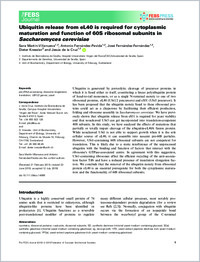Ubiquitin release from eL40 is required for cytoplasmic maturation and function of 60S ribosomal subunits in Saccharomyces cerevisiae
- Martín‐Villanueva, Sara Instituto de Biomedicina de Sevilla Hospital Universitario Virgen del Rocío/CSIC/Universidad de Sevilla Spain - Departamento de Genética Universidad de Sevilla Spain
- Fernández‐Pevida, Antonio Instituto de Biomedicina de Sevilla Hospital Universitario Virgen del Rocío/CSIC/Universidad de Sevilla Spain - Departamento de Genética Universidad de Sevilla Spain
- Fernández‐Fernández, José Instituto de Biomedicina de Sevilla Hospital Universitario Virgen del Rocío/CSIC/Universidad de Sevilla Spain - Departamento de Genética Universidad de Sevilla Spain
- Kressler, Dieter Unit of Biochemistry Department of Biology University of Fribourg Switzerland
- Cruz, Jesús de la Instituto de Biomedicina de Sevilla Hospital Universitario Virgen del Rocío/CSIC/Universidad de Sevilla Spain - Departamento de Genética Universidad de Sevilla Spain
-
2019
Published in:
- The FEBS Journal. - 2020, vol. 287, no. 2, p. 345-360
English
Ubiquitin is generated by proteolytic cleavage of precursor proteins in which it is fused either to itself, constituting a linear polyubiquitin protein of head‐to‐tail monomers, or as a single N‐terminal moiety to one of two ribosomal proteins, eL40 (Ubi1/2 precursors) and eS31 (Ubi3 precursor). It has been proposed that the ubiquitin moiety fused to these ribosomal proteins could act as a chaperone by facilitating their efficient production, folding and ribosome assembly in Saccharomyces cerevisiae. We have previously shown that ubiquitin release from eS31 is required for yeast viability and that noncleaved Ubi3 can get incorporated into translation‐competent 40S subunits. In this study, we have analysed the effects of mutations that partially or totally impair cleavage of the ubiquitin‐eL40A fusion protein. While noncleaved Ubi1 is not able to support growth when it is the sole cellular source of eL40, it can assemble into nascent pre‐60S particles. However, Ubi1‐containing 60S ribosomal subunits are not competent for translation. This is likely due to a steric interference of the unprocessed ubiquitin with the binding and function of factors that interact with the ribosome's GTPase‐associated centre. In agreement with this suggestion, Ubi1‐containing ribosomes affect the efficient recycling of the anti‐association factor Tif6 and have a reduced presence of translation elongation factors. We conclude that the removal of the ubiquitin moiety from ribosomal protein eL40 is an essential prerequisite for both the cytoplasmic maturation and the functionality of 60S ribosomal subunits.
- Faculty
- Faculté des sciences et de médecine
- Department
- Département de Biologie
- Language
-
- English
- Classification
- Biological sciences
- License
-
License undefined
- Identifiers
-
- RERO DOC 327373
- DOI 10.1111/febs.14999
- Persistent URL
- https://folia.unifr.ch/unifr/documents/308067
Statistics
Document views: 142
File downloads:
- pdf: 200
